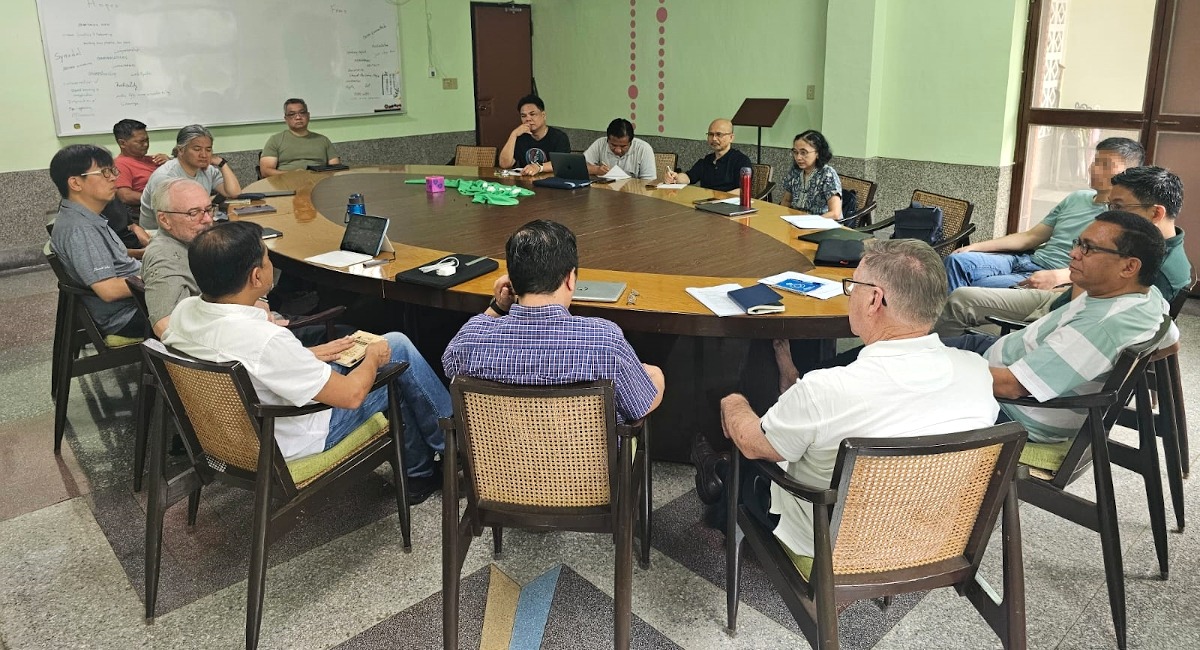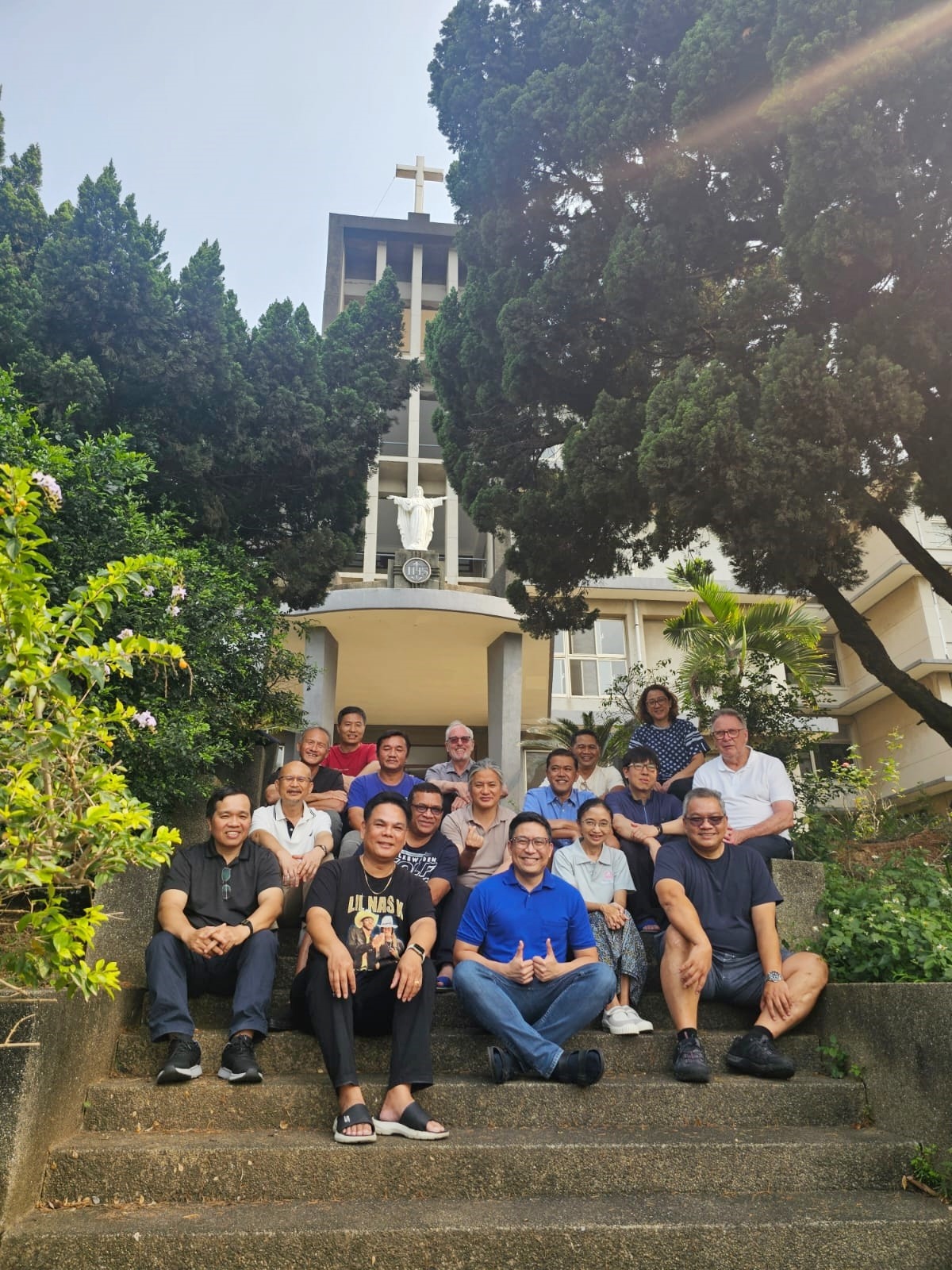 The annual conference of the Ignatian Spirituality Network (ISN) was recently held at the Manresa Center of Spirituality in Changhua, Taiwan. The conference included delegates from 12 provinces and regions. A total of 17 participants attended, including myself, a laywoman, and another laywoman from Indonesia.
The annual conference of the Ignatian Spirituality Network (ISN) was recently held at the Manresa Center of Spirituality in Changhua, Taiwan. The conference included delegates from 12 provinces and regions. A total of 17 participants attended, including myself, a laywoman, and another laywoman from Indonesia.
The meeting began with presentations by each province/region regarding their ISN activities. These presentations provided a wealth of knowledge and experiences in developing Ignatian Spirituality programmes according to each delegate’s context. Each region/province faces unique challenges, however, all demonstrate commendable local creativity in their responses.
Indeed, most of the participants work as spiritual directors or in retreat houses. My friend from Indonesia and I were the only attendees from the secular world. However, having attended four ISN meetings myself and my friend three has proven to be a valuable opportunity. We gained significant insight into ISN and its dynamics in Asia Pacific.
One of the things that struck me as a laywoman working outside of a religious institution was how wide the scope of ISN’s concerns was. This breadth is due to the varied social, cultural, political, and economic backgrounds of the diverse member countries of our Jesuit Conference of Asia Pacific (JCAP). These differences give rise to variations in needs, challenges, and issues surrounding ISN development, all of which need proportional attention in JCAP ISN meetings.
 For example, last year’s Cambodia meeting addressed a wide range of topics, including ecological conversion, initial conversion, ongoing conversion, information and resource sharing, webinar arrangements, and ISN local team initiation. This broad focus left me feeling overwhelmed and convinced of the need for a sharper direction to maximise the impact of JCAP ISN conferences on participants from various regions/provinces.
For example, last year’s Cambodia meeting addressed a wide range of topics, including ecological conversion, initial conversion, ongoing conversion, information and resource sharing, webinar arrangements, and ISN local team initiation. This broad focus left me feeling overwhelmed and convinced of the need for a sharper direction to maximise the impact of JCAP ISN conferences on participants from various regions/provinces.
The diverse backgrounds across our regions/provinces illustrate the need for stronger cooperation. Collaboration allows for the mutual exchange of resources related to ISN, including speaker expertise and reference materials. The JCAP ISN meeting should effectively facilitate various possibilities for cross-regional/provincial cooperation. Appointing region/province representatives on a longer term could ensure more consistent and continuous discussion of topics across JCAP-ISN meetings.
The three-round spiritual conversation method was consistently used for decision-making in both small and large groups throughout the conference. This experience provided me with a concrete understanding of the practice of discernment in common. That some decisions were left open for further reflection was a new experience for me, being accustomed to making clear and actionable decisions for easy follow-up.
Seeing the breadth of issues within the scope of JCAP ISN encouraged me to network. It gave me the courage to start conversations, put forward my own ideas, and open myself to ideas that at first seemed nonsense to me. I was moved to open myself to all kinds of possibilities, not just those I liked or understood. Even though we come from different backgrounds, the group felt close and warm. I particularly enjoyed the friendship between us as laywomen and them as Jesuits. It has inspired me to make more friends across religions and cultures.
The JCAP ISN conference emphasised the importance of actively engaging the laity in the future of the Church. This reminds me of a letter from the Indonesian Jesuit provincial that touched on the concept of the “Laity Church”. In it, he described a dream of lay Ignatian apostles emerging in Indonesia. He expressed hope that the Society of Jesus would be enriched by this lay perspective, and envisioned the future of the Society of Jesus as built on genuine collaboration between clergy and laity.
I was surprised to learn that ongoing formation in Ignatian Spirituality is not only needed for the laity but for the Jesuits themselves. During the conference in Changhua, several Jesuit participants emphasised the need for Jesuits to continuously practice spiritual conversations and discernment in common within the context of their ministries. Everyone acknowledged the need to improve the quality of Ignatian formation, both for Jesuits and lay colleagues, and JCAP ISN is expected to facilitate this deepening process, especially for young Jesuits.
As a woman, a layperson, and someone working in the secular world, I found myself in a triple minority within the JCAP ISN group. The other participants were men, Jesuits, and work in the area of spirituality. Despite this, I felt appreciated and welcomed. Even with limited language skills and knowledge of Ignatian Spirituality, I felt that all members listened attentively and provided space for me to convey my ideas and express my feelings.
As a wife and mother, I want to apply the principles of Ignatian Spirituality in my relationships with those closest to me. I want my family to become fertile ground for the growth of the Catholic faith.
Professionally, as a leader in a company, I want to consistently develop Ignatian leadership competencies, which are both effective and affective, through appropriate formation programmes.
As part of the Church community, in my role as a member of the Archdiocese of Semarang Synod team, I want to help promote the importance of continuous lay formation in the life of the Church. Hopefully, the Church will be more open and ready to walk together with many other parties.
As a lay colleague of the Society of Jesus, I want to contribute to the Apostolic Plan of the Indonesian Province by supporting lay formation programmes. I pray that the Society of Jesus will increasingly find the strength to walk with lay colleagues.
 Mg Sulistyorini is the Executive Director of Kanisius Publishing and Printing (PT Kanisius), an apostolate of the Indonesian Jesuits in Yogyakarta.
Mg Sulistyorini is the Executive Director of Kanisius Publishing and Printing (PT Kanisius), an apostolate of the Indonesian Jesuits in Yogyakarta.

